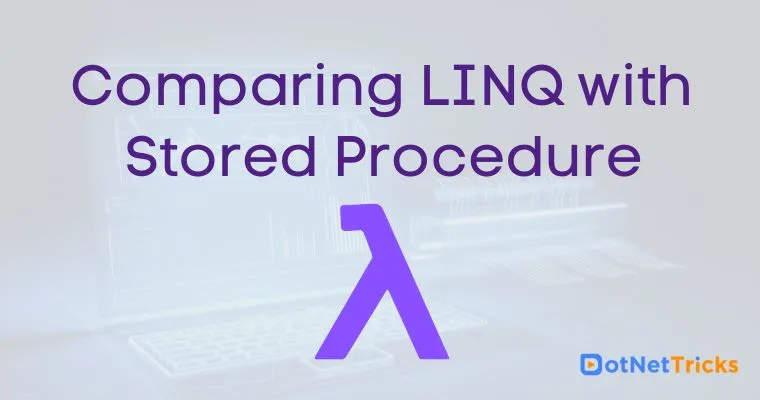Comparing LINQ with Stored Procedure

ASP.NET MVC with WebAPI Course
LINQ Vs stored procedure: An Overview
LINQ provides you with common query syntax to query various data sources like SQL Server, Oracle, DB2, web services, XML and Collection, etc. LINQ also has full type checking at compile-time and IntelliSense support in Visual Studio, since it used the .NET framework languages like C# and VB.NET.

On the other hand, a stored procedure is a pre-compiled set of one or more SQL statements that are stored on RDBMS (SQL Server, Oracle, DB2 MySQL, etc.). The main advantage of stored procedures is that they are executed on the server side and perform a set of actions, before returning the results to the client side. This allows a set of actions to be executed with minimum time and also reduces the network traffic. Let's Understand both concepts first, and then we will observe the actual differences between them.
Understanding LINQ:
Language-integrated query (LINQ) is a versatile and flexible technology that allows developers to query data from various sources concisely and expressively. The term "Language-Integrated" refers to the fact that LINQ is built into the C# and Visual Basic programming languages, which means that developers can write queries using the familiar syntax of these languages.
Advantages of LINQ:
It allows developers to access table columns as a property. This makes it easier to work with data and reduces errors caused by type mismatches.
It is type-safe, Due to this query errors are type-checked at compile time. This helps to catch errors early on in the development process and can save time and effort.
It is a universal query language that can be used to work with a wide range of data sources, including databases, XML files, JSON files, lists, arrays, and dictionaries. It is a powerful and versatile tool for developers and eliminates the need to learn and use multiple query languages for different data sources.
Disadvantages of LINQ:
The statements process of LINQ is a complete query each time it executes, This means that even if only a small amount of data has changed since the last query was executed, the entire query will still be reprocessed.
LINQ does not directly support features like encryption and decryption. While it is possible to encrypt and decrypt data using LINQ statements, But it is typically done using other tools and techniques. This can increase complexity.
Understanding Stored Procedure:
It is a group of pre-written SQL statements that are compiled and stored in a database. Stored Procedures are used to perform a specific task or a set of tasks in a database. They are often used to perform complex operations such as data transformation, validation, and aggregation.
Advantages of Stored Procedure:
Stored Procedure offers directly operative features such as encryption and decryption of data at the column level. This means, data can be protected by encrypting sensitive data and decrypted only when necessary.
Stored Procedure can join data from multiple tables, aggregate data, and perform complex calculations and transformations.
Disadvantages of Stored Procedure:
Stored procedures are often specific to a particular version of a database or database management system. Hence upgrading to a new version of the same database, or when migrating to a different database system together, developers may need to spend a huge amount of time rewriting or modifying their code.
Stored procedures can utilize database server resources such as memory, CPU, and I/O, This can impact the performance and responsiveness of the database system, especially when working with large data sets or complex queries.
LINQ Vs Stored Procedure: The Actual Difference
Stored procedures are faster as compared to LINQ queries since they have a predictable execution plan and can take full advantage of SQL features. Hence, when a stored procedure is being executed next time, the database uses the cached execution plan to execute that stored procedure.
LINQ has full type checking at compile-time and Intellisense support in Visual Studio as compared to a stored procedure. This powerful feature helps you to avoid run-time errors.
LINQ allows debugging through a .NET debugger as compared to a stored procedure.
LINQ also supports various .NET framework features like multithreading as compared to stored procedures.
LINQ provides a uniform programming model (which means common query syntax) to query multiple databases while you need to re-write the stored procedure for different databases.
A stored procedure is the best way to write complex queries as compared to LINQ.
Deploying a LINQ-based application is much easier and simpler as compared to stored procedures-based. In the case of stored procedures, you need to provide a SQL script for deployment but in the case of LINQ, everything gets compiled into the DLLs. Hence you need to deploy only DLLs.
Limitation of LINQ over Stored Procedures
LINQ query is compiled every time while stored procedures re-used the cached execution plan to execute. Hence, a LINQ query takes more time in execution as compared to stored procedures.
LINQ is not good for writing complex queries as compared to stored procedures.
LINQ is not a good way for bulk insert and update operations.
Performance is degraded if you don't write the LINQ query correctly.
If you have made some changes in your query, you have to recompile it and redeploy its DLLs to the server.
Summary:
I hope you will enjoy LINQ and stored procedures while playing with the database. I would like to have feedback from my blog readers. Your valuable feedback, questions, or comments about this article are always welcome. Enjoy coding...!





